intellijel Link Connector Access Jacks User Manual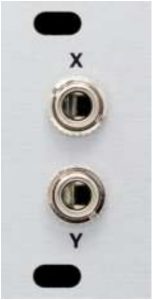
COMPLIANCE
![]() This device complies with Part 15 of the FCC Rules. Operation is subject to the following two conditions:
This device complies with Part 15 of the FCC Rules. Operation is subject to the following two conditions:
- this device may not cause harmful interference, and
- this device must accept any interference received, including interference that may cause undesired operation.
Changes or modifications not expressly approved by Intellijel Designs, Inc. could void the user’s authority to operate the equipment.
![]() Any digital equipment has been tested and found to comply with the limits for a Class A digital device, pursuant to part 15 of the FCC Rules. These limits are designed to provide reasonable protection against harmful interference when the equipment is operated in a commercial environment. This equipment generates, uses, and can radiate radio frequency energy and, if not installed and used in accordance with the instruction manual, may cause harmful interference to radio communications.
Any digital equipment has been tested and found to comply with the limits for a Class A digital device, pursuant to part 15 of the FCC Rules. These limits are designed to provide reasonable protection against harmful interference when the equipment is operated in a commercial environment. This equipment generates, uses, and can radiate radio frequency energy and, if not installed and used in accordance with the instruction manual, may cause harmful interference to radio communications.
This device meets the requirements of the following standards and directives:
EMC: 2014/30/EUEN55032:2015 ; EN55103-2:2009 (EN55024) ; EN61000-3-2 ; EN61000-3-3
Low Voltage: 2014/35/EUEN 60065:2002+A1:2006+A11:2008+A2:2010+A12:2011
RoHS2: 2011/65/EUWEEE: 2012/19/EU
INSTALLATION
This module is designed for use within an Intellijel-standard 1U row, such as contained within the Intellijel 4U and 7U Eurorack cases. Intellijel’s 1U specification is derived from the Eurorack mechanical specification set by Doepfer that is designed to support the use of lipped rails within industry standard rack heights.
Because XY IO 1U is a passive module, it requires no power to operate.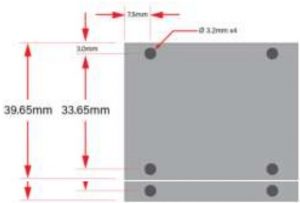

OVERVIEW
Use this module to tap into the 3-pin LINK connector used in several Intellijel products, including Mixup, Pedal I/O and the Palette and 2nd Generation Audio Jacks Board in a 7U case.
It uses two 3.5mm TRS jacks, which accept insert cables to provide send/return capability to a pair of Pedal I/O’s, or additional stereo inputs (or outputs) to a pair of Mixups, or one of each.
A third 3-pin Link connector on the back panel allows the X and Y jacks to access the L/R (or Send/Return) jacks on a single connected module or case without needing a stereo cable.
FRONT & BACK PANELS
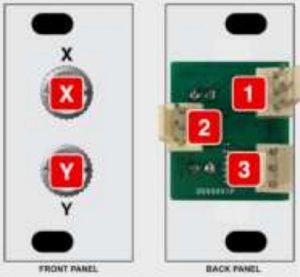
- X. X – This stereo 3.5mm (tip/ring/sleeve) jack connects to JP1 [1] and JP2 [2] on the back panel as follows:TIP: connects to both JP1 PIN 1 and JP2 PIN 1RING: connects to JP1 PIN 3SLEEVE: Ground
- Y. Y – This stereo 3.5mm (tip/ring/sleeve) jack, connects to JP2 [2] and JP3 [3] on the back panel as follows:TIP: connects to both JP3 PIN 1 and JP2 PIN 3RING: connects to JP3 PIN 3SLEEVE: Ground
The illustration on the right shows how the X and Y jacks are wired to the JP1, JP2 and JP3 jacks on the back panel.

- JP1 – This 3-pin LINK connector is internally wired to the X [X] TRS jack on the front panel as follows:PIN 1: connects to X TIPPIN 2: connects to groundPIN 3: connects to X RINGConnect this to another module’s 3-pin Link Connector.
 Example 1: Mixup – Connecting JP1 to the CHAIN IN on an Intellijel Mixup gives you an extra stereo input through the front panel X jack, where X TIP = LEFT CH of Mixup, and X RING = RIGHT CH of Mixup.
Example 1: Mixup – Connecting JP1 to the CHAIN IN on an Intellijel Mixup gives you an extra stereo input through the front panel X jack, where X TIP = LEFT CH of Mixup, and X RING = RIGHT CH of Mixup.
Example 2: Pedal I/O – Connecting JP1 to a Pedal I/O provides you with send and return on a single 3.5mm TRS insert cable, where X TIP = SEND and X RING = RETURN.
- JP2 – This 3-pin LINK connector is wired to both the X [X] and Y [Y] TRS jacks on the front panel. Specifically:PIN 1: connects to X TIPPIN 2: connects to groundPIN 3: connects to Y TIPThis lets you connect a Pedal I/O without using a TRS insert cable. Specifically:X jack (TIP) = SEND to PedalY jack (TIP)= RETURN from Pedal.It also lets you feed the Left and Right CHAIN IN connector on a Mixup using regular mono eurorack cables. Specifically:X jack (TIP) = LEFT input to MixupY jack (TIP)= RIGHT input to Mixup.
- JP3 – This 3-pin LINK connector is internally wired to the Y [Y] TRS jack on the front panel as follows:PIN 1: connects to Y TIPPIN 2: connects to groundPIN 3: connects to Y RINGThis works as described for JP1, and provides the same connection options to external modules, except that the Y jack (and not the X) is connected to JP3.
OTHER USES
Other usages are possible given a bit of ingenuity. These include:
- Make a Midi TRS Type-A to Type-B converter by cross patching the pins on the back with a jumper cable.
- Make an ⅛” Floating Ring converter by linking the two together with only 2 of the pins.
- Simple ¼” to ” converter with the Case Jacks.
- ⅛” jacks for the Stereo Line In 1U for smaller synths like the Volcas or Roland Boutique series.
- Use the Jacks as an I2C(NOTE) header to link I2C modules across cases.
- I2C(NOTE) from something like the ER-301 (3Pin) to the 16-N Faderbank (TRS)NOTE: Mileage may vary with I2C, depending on the hardware involved.
TECHNICAL SPECIFICATIONS
| Width |
4 hp |
| Maximum Depth |
24 mm |
| Current Draw |
No current draw – module is passive |
[xyz-ips snippet=”download-snippet”]

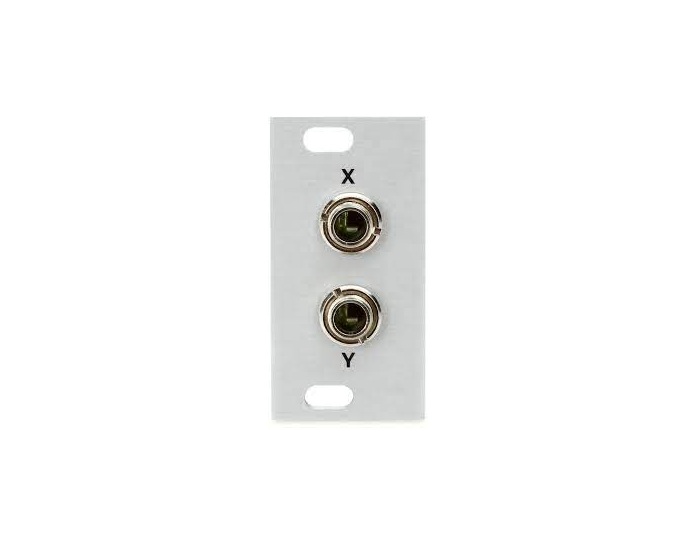
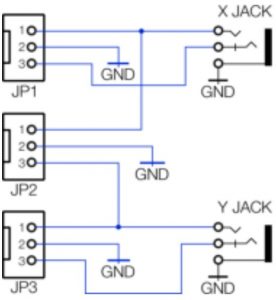
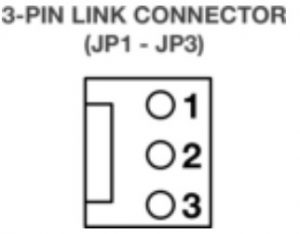 Example 1: Mixup – Connecting JP1 to the CHAIN IN on an Intellijel Mixup gives you an extra stereo input through the front panel X jack, where X TIP = LEFT CH of Mixup, and X RING = RIGHT CH of Mixup.
Example 1: Mixup – Connecting JP1 to the CHAIN IN on an Intellijel Mixup gives you an extra stereo input through the front panel X jack, where X TIP = LEFT CH of Mixup, and X RING = RIGHT CH of Mixup.